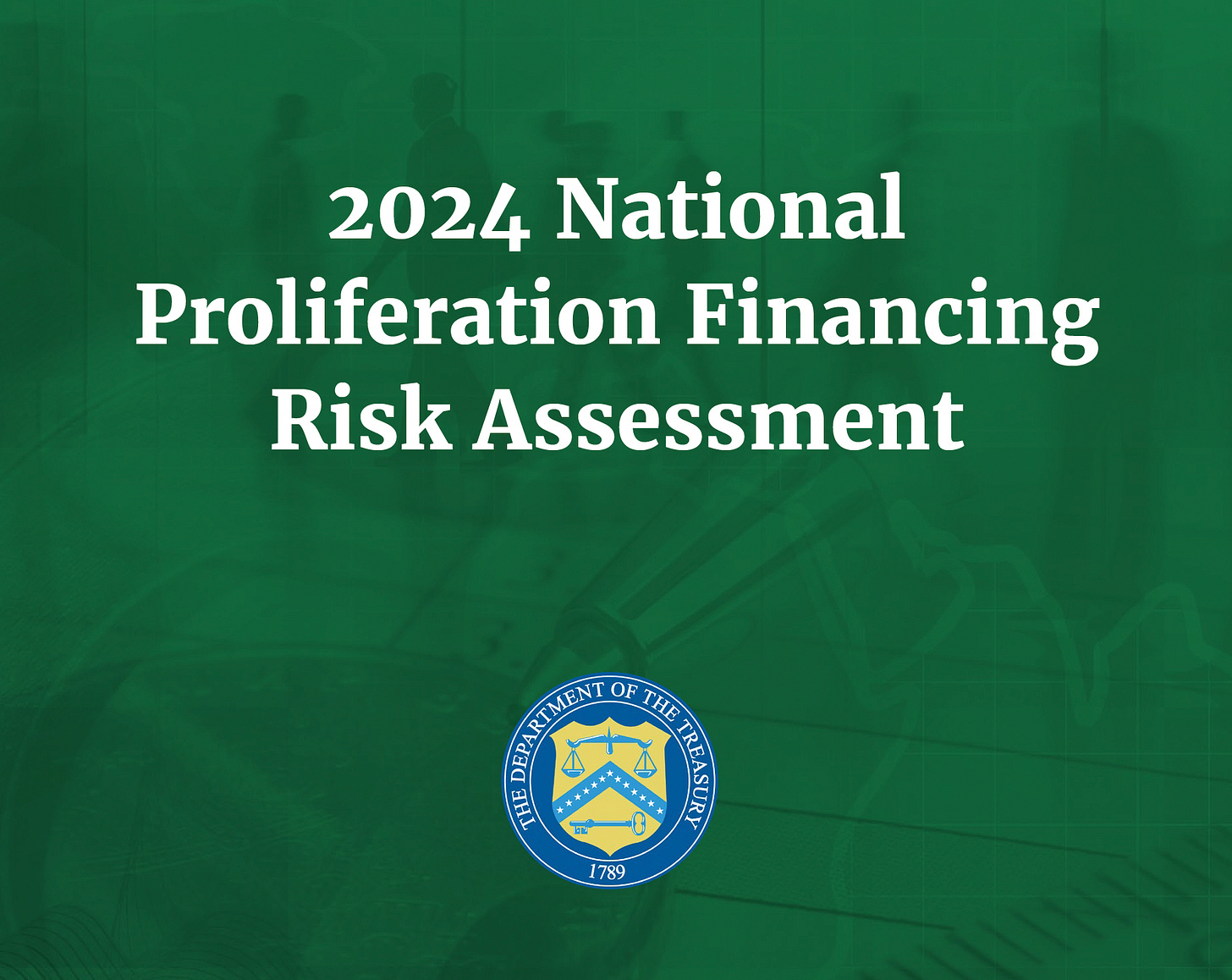US releases Nat’l PF Risk Assessment; Russia unfreezes some NK money; US identifies billion-dollar Iranian oil trafficking network; Banks still vulnerable to Iranian sanctions evaders
Prohibited Transactions for the week of 5 Feb 2024 (#37)
//Hi everyone, thanks for reading! I will be taking a two week publishing break for the Lunar New Year and some family events. The next issue of Prohibited Transactions will come out on 1 March 2024. Wishing you happiness and prosperity in the Year of the Dragon!
North Korea
The US government released its 2024 National Proliferation Financing Risk Assessment, identifying the DPRK as a proliferation financing (PF) threat actor. Along with Moscow, Pyongyang is considered “a significantly higher threat.” The risk assessment noted the DPRK’s accelerated use, theft, and laundering of virtual assets to fund their illicit weapons programs, and provided case studies from previous civil asset forfeiture actions and criminal prosecutions related to cyber-enabled PF involving North Korean illicit actors.
According to US media, the Russian government released USD9 million out of USD30 million in frozen DPRK funds deposited at a Russian bank, which US intelligence officials say will be used by Pyongyang to purchase crude oil. A North Korean front company appears to have also opened an account at a bank in South Ossetia, a self-proclaimed independent state with close ties to Russia. //Having the North Koreans open an account in South Ossetia gives Moscow a sheen of plausible deniability about any assistance they may be providing Pyongyang, and allows them to claim continued adherence to UN sanctions.
Russia’s ambassador to North Korea said that 2024 “will be the breakthrough one in Russian-Korean relations by many indicators.”
A US official stated that on at least nine occasions, Russia used DPRK-supplied ballistic missiles on attacks against Ukraine. In the days following the official’s comments, a Ukrainian paper reported that Russia had launched at least two more North Korean missiles at Ukraine.
The Chinese city of Pingdu, Shandong province — the self-proclaimed “eyelash capital of the world” — serves as a key node for false eyelashes that originate in North Korea, but are completed and sold as Chinese products. As many as 80 percent of the eyelash factories in Pingdu purchase or process false eyelash raw materials and semi-finished products from the DPRK, which are then exported Japan, South Korea, and the West.
According to covert reporting from inside North Korea, as part of a regional development push ordered by Kim Jong-un, a North Korean province bordering the PRC has been tasked with establishing joint ventures with foreign entities to focus on production. However, local officials may have difficulties in finding foreign partners, as many Chinese businesspeople are not interested in doing business with the DPRK after their self-imposed COVID-19 lockdowns.
North Korea abolished laws on inter-Korean economic cooperation, international tours of Mount Kumgang, and regulations for enforcement and agreements on inter-Korean economic cooperation.
According to the leaked copy of the upcoming UN Panel of Experts (PoE) report on North Korea, the panel is “investigating 58 suspected DPRK cyberattacks on cryptocurrency-related companies between 2017 and 2023, valued at approximately $3 billion, which reportedly help fund DPRK's WMD development.” The DPRK is also targeting defense companies and supply chains.
Iran
The US government released its 2024 National Proliferation Financing Risk Assessment, identifying Iran as a threat actor. Though Tehran does not have a testable nuclear device yet, it is moving in that direction. The US is also concerned about Iran’s development, procurement, and proliferation of unmanned aerial vehicles (UAVs). Case studies involving Iran covered UAVs, petrochemicals, industrial equipment, and ballistic missiles.
The US Justice Department announced charges against a number of individuals in an interlocking series of cases involving the selling of Iranian crude oil to the PRC, Russia and Syria, for the benefit of the Islamic Revolutionary Guard Corps (IRGC) and its Qods Force (IRGC-QF). In addition to the charges, the US seized USD108 million in funds, as well as more than 500,00 barrels of Iranian oil. //I only had time to quickly skim some of the indictments, but it didn’t look like there was anything new in terms of the money laundering techniques, it’s the same type of evasion we are familiar with — vessels going dark, mislabeling of oil, front companies, etc. These charges are a clear sign of Washington’s displeasure toward the PRC’s “teapot” oil refineries purchasing Iranian crude, and it will be interesting to see if this induces any behavioral changes by the refineries or PRC government.
Iranian front companies used accounts at two of the UK’s biggest banks — Lloyds and Santander UK — as part of a sanctions evasion scheme that raised hundreds of millions of dollars for the IRGC-QF as well as Iran’s proxy militias. Using trustee agreements and nominee directors, Iran’s state-controlled Petrochemical Commercial Company (PCC) was able to receive funds from Iranian front companies based in the PRC. //This story highlights the difficulties of being able to properly identify an illicit network hiding in a bank’s accounts. You may catch glimpses, but it can be difficult to really get the full picture.
A small Hamburg-based German bank, Varengold Bank AG, is accused by Western intelligence officials of funneling money on behalf of Iran to its proxy fighters in Lebanon and Yemen, possibly laundering billions in illicit transactions. The bank denied the claims and said any transactions with Iran were related to humanitarian aid, such as food and medical equipment.
The Iraqi government banned eight local banks from engaging in US dollar transactions, in an attempt to reduce fraud and money laundering. This is part of a broader effort to crack down on currency smuggling with neighboring Iran, and follows a visit last week from a US Treasury official looking to protect Iraq’s financial sector from “abuse by Iran.”
An Iranian official stated that there are over 400 investment projects in the planning stages for the country’s free trade zones. //The article does not clarify if these are domestic or international investors.



